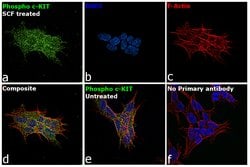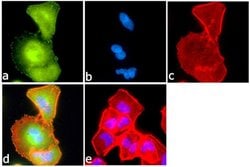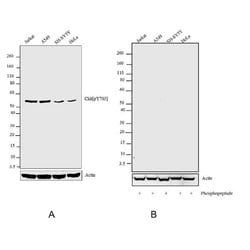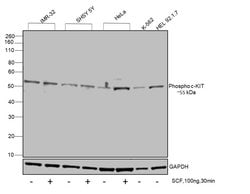Learn More
Invitrogen™ Phospho-c-Kit (Tyr703) Recombinant Superclonal™ Antibody (22HCLC)
Rabbit Recombinant Superclonal Antibody
Supplier: Invitrogen™ 710762
Description
This antibody is predicted to react with Monkey, Rat, Mouse, Pig, Bovine, Rabbit and Dog. Recombinant rabbit Superclonal™ antibodies are unique offerings from Thermo Fisher Scientific. They are comprised of a selection of multiple different recombinant monoclonal antibodies, providing the best of both worlds - the sensitivity of polyclonal antibodies with the specificity of monoclonal antibodies - all delivered with the consistency only found in a recombinant antibody. While functionally the same as a polyclonal antibody - recognizing multiple epitope sites on the target and producing higher detection sensitivity for low abundance targets - a recombinant rabbit Superclonal™ antibody has a known mixture of light and heavy chains. The exact population can be produced in every lot, circumventing the biological variability typically associated with polyclonal antibody production. Note: Formerly called Recombinant polyclonal antibody, this product is now rebranded as Recombinant Superclonal™ antibody. The physical product and the performance remain unchanged.
KIT (c-KIT) is a proto-oncogene and a type 3 transmembrane receptor for MGF (mast cell growth factor, also known as stem cell factor). KIT was first identified as the cellular homolog of the feline sarcoma viral oncogene v-kit. KIT together with its ligand regulates growth and activation of a variety of hemopoietic and non-hemopoietic cells. Mutations in KIT are associated with gastrointestinal stromal tumors, mast cell disease, acute myelogenous leukemia, and piebaldism. Recently, deregulation of the KIT receptor TK by the prevalent activation loop mutation D816V has served as a focal point in therapeutic strategies aimed at curbing neoplastic mast cell growth. c-Kit is expressed in hematopoietic stem cells, germ cells, mast cells and gastrointestinal tract cajal cells. Upon binding of its ligand stem cell factor (SCF), c-kit dimerizes, resulting in receptor activation and autophosphorylation of various tyrosine residues including tyrosine 703 located on the cytoplasmic domain of the receptor. This modification allows docking of Grb2 and activation of the Ras/ERK signaling pathway. SCF/c-kit can activate multiple downstream signaling pathways including PI3K, PLC-gamma and JAK/STAT. c-kit receptor activation is essential for hematopoiesis, stem cell maintenance and gametogenesis.
Specifications
| Phospho-c-Kit (Tyr703) | |
| Recombinant Superclonal | |
| 0.5 mg/mL | |
| PBS with 0.09% sodium azide; pH 7.2 | |
| P10721 | |
| KIT | |
| phosphopeptide corresponding to human c-Kit, Tyr703 (aa 699-707). | |
| 100 μg | |
| Primary | |
| Human | |
| Antibody | |
| IgG |
| Western Blot, Immunocytochemistry | |
| 22HCLC | |
| Unconjugated | |
| KIT | |
| belly-spot; Bs; CD117; ckit; C-Kit; c-KIT gene1; c-kit protein; c-kit proto-oncogene protein; c-kit receptor; c-kit receptor tyrosine kinase; dominant spotting; Dominant white spotting; Fdc; Gsfsco1; Gsfsco5; Gsfsow3; KIT; kit oncogene; KIT proto-oncogene receptor tyrosine kinase; KIT proto-oncogene, receptor tyrosine kinase; mast cell growth factor receptor; mast/stem cell growth factor receptor; mast/stem cell growth factor receptor Kit; MGF; p145 c-kit; PBT; Piebald trait protein; protein kinase; proto-oncogene c-Kit; proto-oncogene tyrosine-protein kinase Kit; receptor tyrosine kinase c-kit; receptor tyrosine kinase type III; SCFR; SCO1; SCO5; Sl; soluble KIT variant 1; SOW3; spotted sterile male; Ssm; Steel Factor Receptor; Tr-kit; tyrosine kinase receptor; tyrosine kinase receptor c-KIT; tyrosine-protein kinase Kit; v-kit Hardy-Zuckerman 4 feline sarcoma viral oncogene homolog; v-kit Hardy-Zuckerman 4 feline sarcoma viral oncogene-like protein; W | |
| Rabbit | |
| Protein A | |
| RUO | |
| 3815 | |
| Store at 4°C short term. For long term storage, store at -20°C, avoiding freeze/thaw cycles. | |
| Liquid |
Your input is important to us. Please complete this form to provide feedback related to the content on this product.



